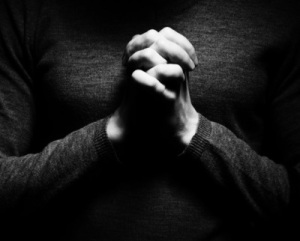 The wind here in the mountains has been fiercely blowing since late yesterday evening. After a nearly perfect spring day on Palm Sunday, the wind picked up and hasn’t stopped since. The huge trunks of the great oak in the back are even moving (which they rarely do). And while our house was built to withstand such winds, it’s been creaking and even shuddering at times from the gusts and billows. “Howling like Hell” is a perfect description for the weather this morning, which brings me to this entry.
The wind here in the mountains has been fiercely blowing since late yesterday evening. After a nearly perfect spring day on Palm Sunday, the wind picked up and hasn’t stopped since. The huge trunks of the great oak in the back are even moving (which they rarely do). And while our house was built to withstand such winds, it’s been creaking and even shuddering at times from the gusts and billows. “Howling like Hell” is a perfect description for the weather this morning, which brings me to this entry.
In a recent interview with Pope Francis (early 2024), he said that he hoped that Hell would be empty. On the surface, that sounds great — but it misses the real point of Hell on so many levels. A few were quick to respond, with one of the better rebuttals coming from Dennis Prager, a reformed Jew who said that he hoped for the opposite: that some people would go to Hell (i.e., that it would indeed not be empty, or at least not completely). He went on to say why, both in his weekly column and in a Fireside Chat that followed (https://dennisprager.com/column/the-pope-hopes-no-one-is-in-hell-we-should).
So how can someone counter another who wants no one to go to Hell? Because without Hell (or at least some form of punishment in the afterlife), God would not be just. And if God is not just, then He’s not a god worth following (paraphrased). And those are soberingly true statements. Those who wish for Hell to be empty are awfully close (theologically) to those who would deny the very existence of Hell.
Nearly ten years ago in a Washington Post interview, Ben Carson surprised many people by saying he doesn’t believe in a literal hell, because he contends that a loving God would never torment anyone in Hell, especially for eternity (https://www.washingtonpost.com/news/post-politics/wp/2015/12/01/why-ben-carson-doesnt-believe-in-hell/). As a member of the Seventh Day Adventist church, this is one of several significant differences between that belief system and mainstream/orthodox Christianity. However, this is a common hindrance to faith in God that many cite when they ask: “How can a loving God allow pointless suffering?” or “How can a loving God send someone to Hell?”
 Such questions are the type in which the people asking them don’t necessarily want answers as much as stating ( in the form of a question) why they’re refusing to believe in God. Whether they realize it or not (let’s assume “not”), they’re impugning God’s character and several of His primary traits: that He is holy, that He is just, and that He is loving. With one simple rhetorical question much like that which was first asked in the Garden of Eden (“Did God really say…?”), the faith of many has been hampered or destroyed and the character of God called into question.
Such questions are the type in which the people asking them don’t necessarily want answers as much as stating ( in the form of a question) why they’re refusing to believe in God. Whether they realize it or not (let’s assume “not”), they’re impugning God’s character and several of His primary traits: that He is holy, that He is just, and that He is loving. With one simple rhetorical question much like that which was first asked in the Garden of Eden (“Did God really say…?”), the faith of many has been hampered or destroyed and the character of God called into question.
The issue is trifold much like the Trinity (Three in One): that God is perfectly just while being perfectly holy AND perfectly loving. He cannot and does not violate His nature, and therefore the resolution of the conflicts between those three traits can sometimes seem odd to us, or at least unintuitive. Though He loves fiercely, He cannot tolerate evil or sin and His very being demands justice — and not just for those wronged or harmed when injustice occurs — but for His own Self.
A real-world example of His nature is to consider the sun: the sun provides incredible light, power, and unfathomable heat, but they are inseparable; you cannot have one without the others. The sun is completely intolerant of anything cooler than itself and vaporizes anything that approaches it — unless it’s wrapped in some form of heat-shield capable of protecting it from the sun’s unforgiving fury!
Such it is with God and His holiness, love, and justice; He cannot tolerate sin and evil in any form unless it’s somehow shielded or protected from Him. His very nature demands justice, yet He is also incredibly merciful and loving. The only way we sinful creatures are protected from His holy nature is by wrapping ourselves in the righteousness of Jesus, the one and only Mediator that God has provided for us to draw near to Him — and for Him to draw near to us. God is committed to making us holy, to burning away all the sin and evil from our hearts so we can dwell with Him in Heaven.
Since God created everything and will fill all Creation with Himself and His love and holiness (and those who are conformed to Himself), what is He to do with those who refuse His love? What is He to do with those who refuse to wrap themselves in the blood of Christ, our “sin-shield”? They must either be annihilated or be cast completely out of the entire Creation — into the Outer Darkness. And annihilation isn’t really an option for God because He has created us in His image: as eternal beings.
 Ironically, the Person who spoke the most about the reality of Hell was Jesus Christ Himself. Before He began teaching on the reality of Hell and its torment, Sheol (or the Pit) was where souls went after people died — usually described as into the bowels of earth. It was Jesus — God the Son in the Flesh — Who revealed what Hell was all about, and He should know because He created it (Colossians 1:16-17)!
Ironically, the Person who spoke the most about the reality of Hell was Jesus Christ Himself. Before He began teaching on the reality of Hell and its torment, Sheol (or the Pit) was where souls went after people died — usually described as into the bowels of earth. It was Jesus — God the Son in the Flesh — Who revealed what Hell was all about, and He should know because He created it (Colossians 1:16-17)!
In the beginning, God never intended to send people to Hell because it was a place created specifically for Satan and his angels (Matthew 25:41). It wasn’t until we sinned that Hell (or the Outer Darkness) was a possible destination for human beings. Not only that, but because we had chosen Sin and Death over Life (ie, from Him), Hell became our default destination after we die. Again, if God has made everything and people choose not to be with Him by accepting His salvation, then what is He to do with them? He has to send them outside of His Creation — into the Outer Darkness.
The horrible reality of Hell and the tragic majority of the population of people who will be going there some day is also foretold by Jesus in Matthew 7:13-14 where He says:
“Enter by the narrow gate; for wide is the gate and broad is the way that leads to destruction, and there are many who go in by it. Because narrow is the gate and difficult is the way which leads to life, and there are few who find it.”
While Jesus likely has the same desire as Pope Francis (that few will be sent to Hell), from this passage it seems to be that He knows that this will not be the case. That’s why He came into the world in the first place: to offer salvation through His blood/sacrifice so that no one would have to go to Hell. However, many (or most) will remain on the broad road to destruction (Hell) and very few will actually find the way to life and be saved (ie, through Him).
 We can assume that everyone wants to go to Heaven after they die, but how many people would actually want to go there to be with God and Jesus as they’re described in the Bible? My personal belief is very few indeed; if people really want to have a relationship with God and Jesus, wouldn’t they be pursuing it in this life, while they actually have a choice? If you don’t care about God in this life, why would you want to spend eternity with Him in the next?
We can assume that everyone wants to go to Heaven after they die, but how many people would actually want to go there to be with God and Jesus as they’re described in the Bible? My personal belief is very few indeed; if people really want to have a relationship with God and Jesus, wouldn’t they be pursuing it in this life, while they actually have a choice? If you don’t care about God in this life, why would you want to spend eternity with Him in the next?
Another insight into holiness relates to the subject of suffering. Why does God allow so much suffering in this world? He certainly has the power to do something about it, but all too often He doesn’t. He allows it or even instigates it in some circumstances, particularly in His command to take the Gospel to the ends of the earth and make disciples of every tongue, tribe, and nation.
Were there mass-slaughters in Africa before a few decades ago when the Gospel really began to penetrate the so-called Dark Continent? Yes, but nowhere near on the scale they have been recently. This has been the history of Christianity from the beginning: wherever the Gospel goes and begins to invade a culture, contention, strife, and upheavals follow because Satan and his demons oppose it. They’re not willing to surrender a single inch and will do whatever they can to oppose the Gospel from bringing others to Christ. Jesus gave His message to twelve men who eventually overturned one of the greatest empires in the history of the world, even though it cost them and many others their very lives.
A last insight into God’s holiness is its locale with regards to the earth. Most people speak of going to this wonderful place called Heaven after they die and dwell there forever, but that’s not the picture of the afterlife that the Bible paints. According to the New Testament, people who are saved go to be with Jesus, who currently dwells in Heaven. However, sooner or later, He promises to return to the earth and bring all of His people with Him. Not only that, but after His 1,000-year reign on this earth, the current heavens and earth will vanish away and new ones are created and New Jerusalem (or Heaven) descends to the earth and remains there for Eternity (Revelation 19-22).
 The overarching theme of the Bible is of God dwelling with us. He reaches down and invades our culture, our world with His influence, His Word, and sometimes even His presence. It is HE who’s taking action and making things happen — not us. Yet He has a problem. A BIG problem. He is blindingly holy and just but we are appallingly unholy and unjust. So He invades us and replaces our unholy hearts with His Holy one and sets out to remake us from in the inside out. His plan is to make the world holy again not merely imposing His Will upon it, but by filling it with people who have been made holy.
The overarching theme of the Bible is of God dwelling with us. He reaches down and invades our culture, our world with His influence, His Word, and sometimes even His presence. It is HE who’s taking action and making things happen — not us. Yet He has a problem. A BIG problem. He is blindingly holy and just but we are appallingly unholy and unjust. So He invades us and replaces our unholy hearts with His Holy one and sets out to remake us from in the inside out. His plan is to make the world holy again not merely imposing His Will upon it, but by filling it with people who have been made holy.
While Pope Francis may have had the best of intentions when he said that he hoped that Hell will be empty, I believe it would have been much better for him to say that Hell will be full, that it is humanity’s default destination because of our sin, and that he wishes that everyone would come to a saving knowledge of Jesus Christ by turning to Him in faith, in repentance, and seeking His forgiveness and therefore be saved.
